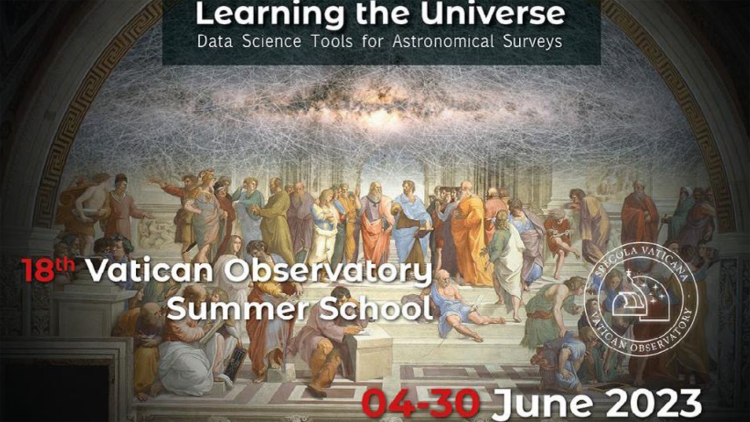
Vatican Observatory Summer School reopens its doors
By Thaddeus Jones
The Vatican Observatory Summer School (VOSS) in Observational Astronomy and Astrophysics will host 24 students from 20 nations for its biennial session running from 4 to 30 June. The study and research school thus reopens its doors after several years of hiatus due to the Covid pandemic.
As in previous years, the sessions will be held at the headquarters of the Vatican’s astronomical observatory in the Papal Summer Gardens of Castel Gandolfo, just southeast of Rome in the Alban hills.
Learning the Universe
The theme of this 18th VOSS is “Learning the Universe: Data Science Tools for Astronomical Surveys.” Dr. Viviana Acquaviva of the City University of New York and the Flatiron Institute, and Dr. Željko Ivezić from the University of Washington and the Vera C. Rubin Observatory, both serve as co-chairs for a faculty bringing together world experts on applied principles of machine learning in astrophysical studies.
Fr. Alessandro Omizzolo, an astronomer at both the Vatican Observatory and the Italian National Institute of Astrophysics (INAF)/Padua Observatory, is Dean of VOSS and in a Vatican Observatory press release noted that, “as telescopes grow larger and the detectors on them become more sensitive, the amount of astronomical data that scientists need to understand has grown dramatically.”
Crunching the numbers
Astronomical surveys have measured billions of celestial sources and future ones will gather even more amounts of data from observations, making the analytical needs literally "astronomical," hence the employment of more and more sophisticated technology to help crunch the numbers.
The 2023 Summer School will explain the science behind these surveys and how Big Data and Machine Learning can assist. Students will gain hands-on experience of data analysis so they can use these data sets for their own astronomical projects, especially as related to their own areas of specialization and research.
At the conclusion, Pope Francis will welcome them, as he has done in previous years with other groups of VOSS participants.
Global representation
This year's students hail from a variety of nations, including: Argentina, Bangladesh, Brazil, Canada, China, Colombia, Croatia, Czech Republic, Denmark, India, Italy, Kazakhstan, Lebanon, Mexico, The Netherlands, Slovakia, Slovenia, South Africa, Spain, Uruguay.
Close to two hundred university and post-graduate students applied to attend VOSS with the selection of only a limited number possible and as wide a range of representation with no country have more than two representatives.
With Drs. Acquaviva and Ivezić, faculty will include Dalya Baron (Tel Aviv University and the Carnegie Observatories), Marc Huertas-Company (Instituto de Astrofísica de Canarias / Observatoire de Paris), and Francisco Antonio Villaescusa Navarro (Flatiron Institute / Princeton University). Joining them will be other experts as guest lecturers.
Co-chair Prof. Ivezić in the Vatican Observatory press release expressed his enthusiasm for “this wonderful opportunity to meet such an outstanding cohort of motivated young colleagues from all over the world,” while fellow co-Chair Dr. Acquaviva said she is "especially thrilled with the community-building aspect of this school" and "the importance of finding one’s network and community is an aspect of academic life that can’t be overstated.”
Open to all
The first Vatican Observator Summer School took place in 1986, and since then more than 400 students have participated in it. The VOSS is open to advanced astronomy undergraduates and beginning graduate students from around the world. Most selected come from developing countries and admission is without regard to financial need, as the tuition is free and travel and housing is assisted through donors to the Vatican Observatory Foundation ensuring all can attend.
Centuries of science
The Vatican Observatory is one of the oldest astronomical institutes in the world. Its origins go back to Pope Gregory XIII who commissioned the study of scientific data and implications involved in the reform of the calendar which occurred in 1582. Its headquarters are at the papal summer gardens in Castel Gandolfo. Thanks to collaboration with the University of Arizona in Tucson, the Vatican Observatory has a telescope on Mt Graham, northeast of Tucson, 3200 m above sea level.
Thank you for reading our article. You can keep up-to-date by subscribing to our daily newsletter. Just click here







